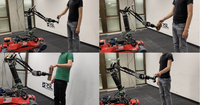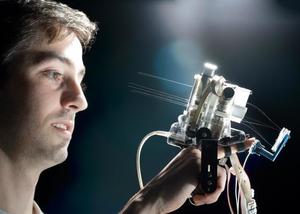Events & Talks
Haptic Intelligence
IS Colloquium
Dr. Maren Bennewitz
Upcoming
05-05-2025
Active Perception, Manipulation, and Personalized Navigation for Advanced Service Robots
Service robots acting in human environments must actively perceive their environment, act foresightedly, and adapt to individual user preferences. In this talk, I will first present methods to enable robots to efficiently perceive the environment and carefully manipulate objects in cluttered scenes. In particular, I will introduce an active mapping approach for confined spaces such as household shelves or horticultural crop rows, where significant occlusions pose challenges for service robots. In these scenarios, robots need to manipulate objects to reduce occlusions and improve visibility....
Katherine J. Kuchenbecker
Haptic Intelligence
IS Colloquium
Dr. Adam Spiers
26-03-2025
Dexterity and Haptics at the Manipulation and Touch Lab
The Manipulation and Touch Lab (MTL) at Imperial College London conducts research on topics related to human and robotic manipulation, tactile sensing, haptic interfaces and applied machine learning. In this talk the PI of the lab, Dr Ad Spiers, (formerly of MPI-IS) will discuss several of the MTL’s novel mechatronic approaches to these topics, focusing particularly on dexterous robotic manipulation and tactile sensors. Ad will also give an overview of his startup’s work on a novel haptic interface to aid navigation for vision-impaired pedestrians.
Katherine J. Kuchenbecker
Haptic Intelligence
PhD Thesis Defense
15-01-2025
Capturing and Recognizing Multimodal Surface Interactions as Embedded High-Dimensional Distributions
Exploring a surface with a handheld tool generates complex contact signals that uniquely encode the surface's properties—a needle hidden in a haystack of data. Humans naturally integrate visual, auditory, and haptic sensory data during these interactions to accurately assess and recognize surfaces. However, enabling artificial systems to perceive and recognize surfaces with human-like proficiency remains a significant challenge. The complexity and dimensionality of multi-modal sensor data, particularly in the intricate and dynamic modality of touch, hinders effective sensing and processing....
Behnam Khojasteh
Katherine J. Kuchenbecker
Haptic Intelligence
PhD Thesis Defense
17-12-2024
Precision Haptics in Gait Retraining for Knee Osteoarthritis
Gait retraining, or teaching patients to walk in ways that reduce joint loading, shows promise as a conservative intervention for knee osteoarthritis. However, its use in clinical settings remains limited by challenges in prescribing optimal gait patterns and delivering precise, real-time biofeedback. This thesis presents four interconnected studies that aim to address these barriers to clinical adoption: First, a regression model was developed to predict patient-specific biomechanical responses to a gait modification using only simple clinical measures, reducing the need for instrumented g...
Katherine J. Kuchenbecker
Nataliya Rokhmanova
Haptic Intelligence
PhD Thesis Defense
23-10-2024
Data-Driven Needle Puncture Detection for Urgent Medical Care Delivery in Space
Needle decompression (ND) is a surgical procedure that treats one of the most preventable causes of trauma-related death: dangerous accumulations of air between the chest wall and the lungs. However, needle-tip overshoot of the target space can result in the inadvertent puncture of critical structures like the heart. This type of complication is fatal without urgent surgical care, which is not available in resource-poor environments like space. Since ND is done blind, operators rely on tool sensations to identify when the needle has reached its target. Needle instrumentation could enable pu...
Katherine J. Kuchenbecker
Rachael Lorsa
Haptic Intelligence
Talk
Lorena Velásquez
05-09-2024
Towards Tendon-Actuated Prostheses with Integrated Haptic Feedback
Individuals with limb loss often choose prosthetic devices to complete activities of daily living (ADLs) as they can provide enhanced dexterity and customizable utility. Despite these benefits, high abandonment rates persist due to uncomfortable, cumbersome, and unreliable designs.
Despite restoring motor function, dexterous sensorimotor control remains severely impaired due to the absence of haptic feedback. This presentation details the design and evaluation of tendon-actuated mock prostheses with integrated state-based haptic feedback and their anthropomorphic tendon-actuated end effect...
Katherine J. Kuchenbecker
Uli Bartels
Haptic Intelligence
PhD Thesis Defense
05-08-2024
Engineering and Evaluating Naturalistic Vibrotactile Feedback for Telerobotic Assembly
Teleoperation allows workers on a construction site to assemble pre-fabricated building components by controlling powerful machines from a safe distance. However, teleoperation's primary reliance on visual feedback limits the operator's efficiency in situations with stiff contact or poor visibility, compromising their situational awareness and thus increasing the difficulty of the task. To bridge this gap, we created AiroTouch, a naturalistic vibrotactile feedback system tailored for use on construction sites but suitable for many other applications of telerobotics. Then we evaluate AiroTou...
Yijie Gong
Katherine J. Kuchenbecker
Haptic Intelligence
IS Colloquium
Dr. Hannah Stuart
18-03-2024
Designing Mobile Robots for Physical Interaction with Sandy Terrains
One day, robots will widely support exploration and development of unstructured natural environments. Much of the work I will present in this lecture is supported by NASA and is focused on robot design research relevant to accessing the surfaces of the Moon or Mars. Tensile elements appear repeatedly across the wide array of missions envisioned to support human or robotic exploration and habitation of the Moon. With a single secured tether either rovers or astronauts, or both, could belay down into steep lunar craters for the exploration of permanently shadowed regions; the tether prevents ...
Katherine J. Kuchenbecker
Haptic Intelligence
PhD Thesis Defense
23-02-2024
Creating a Haptic Empathetic Robot Animal That Feels Touch and Emotion
Social touch, such as a hug or a poke on the shoulder, is an essential aspect of everyday interaction. Humans use social touch to gain attention, communicate needs, express emotions, and build social bonds. Despite its importance, touch sensing is very limited in most commercially available robots. By endowing robots with social-touch perception, one can unlock a myriad of new interaction possibilities. In this talk, I will present my work on creating a Haptic Empathetic Robot Animal (HERA), a koala-like robot for children with autism. I will demonstrate the importance of establishing desig...
Katherine J. Kuchenbecker
Rachael Burns
Haptic Intelligence
Talk
Marie Großmann
23-01-2024
Constructing Perceptions: A Sociological Perspective on Sensors
The sensory perception of the world, including seeing and hearing, tasting and smelling,touching and feeling, are necessary social skills to become a social counterpart. In this context,the construction of a perceptible technology is an intersection where technical artifacts have the
capability to interact and sense their environment. Sensors as technical artifacts not only measure various (physical) states, with their presented results influencing perceptions and actions, but they also undergo technical and computational processing. Sensors generate differences by capturing and measuring ...
Katherine J. Kuchenbecker
Haptic Intelligence
Talk
Dr. Janneke Schwaner
07-12-2023
Biomechanics and Control of Agile Locomotion: from Walking to Jumping
Animals seem to effortlessly navigate complex terrain. This is in stark contrast with even the most advanced robot, illustrating that navigating complex terrain is by no means trivial. Humans’ neuromusculoskeletal system is equipped with two key mechanisms that allow us to recover from unexpected perturbations: muscle intrinsic properties and sensory-driven feedback control. We used unique in vivo and in situ approaches to explore how guinea fowl (Numida meleagris) integrate these two mechanisms to maintain robust locomotion. For example, our work showed a modular task-level control of leg ...
Katherine J. Kuchenbecker
Andrew Schulz
Haptic Intelligence
Talk
Dr. Diego Ospina
17-10-2023
Project neuroArm: Image-guided Medical Robotics Program
Project neuroArm was established in 2002, with the idea of building the world’s first robot for brain surgery and stereotaxy. With the launch (2007) and integration of the neuroArm robot in the neurosurgical operating room (May 2008), the project continues to spawn newer technological innovations, advance tele-robotics through sensors and AI, and intelligent surgical systems towards improving safety of surgery. This talk will provide a high-level overview of two such technologies the team at Project neuroArm is currently developing and deploying: i) neuroArm+HD, a medical-grade sensory imme...
Katherine J. Kuchenbecker
Rachael Lorsa
Haptic Intelligence
Talk
Andreea Tulbure
10-10-2023
Towards Seamless Handovers with Legged Manipulators
Deploying perception and control modules for handovers is challenging because they require a high degree of robustness and generalizability to work reliably for a diversity of objects and situations, but also adaptivity to adjust to individual preferences. On legged robots, deployment is particularly challenging because of the limited computational resources and the additional sensing noise resulting from locomotion. In this talk, I will discuss how we tackle some of these challenges, by first introducing our perception framework and discussing the insights of the first human-robot handover...
Katherine J. Kuchenbecker
Haptic Intelligence
PhD Thesis Defense
09-10-2023
Gesture-Based Nonverbal Interaction for Exercise Robots
When teaching or coaching, humans augment their words with carefully timed hand gestures, head and body movements, and facial expressions to provide feedback to their students. Robots, however, rarely utilize these nuanced cues. A minimally supervised social robot equipped with these abilities could support people in exercising, physical therapy, and learning new activities. This thesis examines how the intuitive power of human gestures can be harnessed to enhance human-robot interaction. To address this question, this research explores gesture-based interactions to expand the capabilities ...
Mayumi Mohan
Katherine J. Kuchenbecker
Haptic Intelligence
IS Colloquium
Prof. Dangxiao Wang
07-07-2023
Wearable Haptics for Virtual Reality
Current virtual reality systems mainly rely on hand-held controllers, which can only provide six-dimensional motion tracking and vibrotactile feedback to users. One promising solution for improving immersion is to develop wearable systems that can capture over 20-DoF hand motion and provide distributed kinesthetic and tactile feedback to the skin. In this talk, I will discuss the technical challenges for developing high-fidelity wearable haptic systems, and then introduce our work on haptic gloves, hand-based haptic rendering algorithms, and the applications of wearable haptic systems in me...
Katherine J. Kuchenbecker
Haptic Intelligence
Talk
Jennifer Leestma
09-06-2023
Biomechanics, Estimation, and Augmentation of Human Balance during Perturbed Locomotion
Recent advances in wearable robotics have unveiled the potential of exoskeletons to augment human locomotion across a variety of environments. However, few studies have evaluated the capability of these devices to augment human balance during unstable locomotion. In this talk, I will discuss how we’re threading together biomechanics, mechanical and mechatronic design, wearable sensor-informed machine learning, and controls to work towards a balance-augmenting exoskeleton. I’ll start by discussing human balance, recovery strategies, and some of the most challenging destabilizing scenarios th...
Katherine J. Kuchenbecker
Andrew Schulz
Haptic Intelligence
Talk
Dr. Yanpei Huang
16-05-2023
Movement Augmentation for Robot-Assisted Surgery
Many surgical tasks require using three or more tools simultaneously. Currently, surgeries are typically performed by a main surgeon and an assistant, where it is known that their performance can be affected by miscommunications. Providing the surgeon with tools and techniques to control three or four surgical tools by themself would avoid miscommunication and could improve the outcome of surgery. However, the current interfaces allowing a surgeon to control several tools offer only limited precision, dexterity and intuitiveness. Therefore, I developed a dedicated foot interface and techniq...
Katherine J. Kuchenbecker
Haptic Intelligence
Talk
Vani Sundaram
15-05-2023
Embedded Sensing and Control for Multi-unit Soft Robotic Systems
Due to the deformable and compliant nature of soft systems, there has been an ongoing need to address the challenges of state estimation and environmental interaction using embedded and distributed sensing. In this talk, I will be sharing the steps I took to develop reliable soft sensors that can be scaled up to control the movements and interactions of various multiunit, electrostatic systems. Initially, I focused on characterizing, sensing, and controlling a single HASEL actuator. However, during this process, we discovered issues with the current method of sensing the movement of these e...
Katherine J. Kuchenbecker
Haptic Intelligence
Talk
Carmelo Mastrandrea
03-05-2023
Continual Ambulatory Monitoring (Bio-Monitor) & Near-Infrared Spectroscopy (NIRS)
Advancements in technology have enabled human physiology and health to be assessed in places and ways that were not previously possible. This presentation provides an overview of the smart-shirt technology used during bed rest and spaceflight investigations both on the ground and aboard the International Space Station. Techniques to obtain high-fidelity, un-intrusive physiological measurements of ambulatory individuals and the application of machine learning to predict oxygen uptake from the wearable sensor data will be discussed. The utilization of near-infrared spectroscopy (NIRS) on the ...
Katherine J. Kuchenbecker
Rachael Lorsa
Haptic Intelligence
Talk
Eric Hedge
03-05-2023
Novel Methods for Assessing Jugular Hemodynamics
Spaceflight induces a headward fluid shift that alters the distribution of blood volume in the human body, leading to distension of astronauts’ veins in their head and neck region while in space. Recently, a jugular venous thrombosis was identified in an astronaut aboard the International Space Station, suggesting an increased risk of thrombus formation. New techniques are needed to better characterize jugular hemodynamics in order understand the risks associated with spaceflight. This presentation provides an overview of high frame rate ultrasound and coded hemodynamic imaging, which are n...
Katherine J. Kuchenbecker
Rachael Lorsa
Haptic Intelligence
Talk
Dr. Paul Strohmeier
10-02-2023
Designing Embodied Vibrotactile Feedback
Technology shapes our perception of the world in many ways. From an Human Computer Interaction (HCI) perspective, one important way in which this happens is through mediation of information. In HCI, vibration is often used to create symbols for mediating information hermeneutically. One of my research interests is to design vibrotactile signals which employ embodied mechanisms of mediation. I demonstrate how a useful approach for such designs is to switch the focus away from the object or event which is to be represented with a vibrotactile signal, and instead focus on the action the user m...
Katherine J. Kuchenbecker
Haptic Intelligence
Talk
Andrew Schulz
23-01-2023
Mechanics and Materials of the Elephant Trunk with Applications to Conservation Technology
An elephant trunk is both flexible and strong, able to pick up peanuts and uproot entire trees. This versatility has made the elephant a model for soft robotics studies that seek to build strong, flexible manipulators. By observing elephant behaviors during different mechanical tasks including elongation, wrapping, and suction feeding we can begin to understand the limitations and capabilities of this hydrostat. We further the understanding of these behaviors by looking into the mechanical properties of the elephant trunk’s skin including the wrinkled behavior commonly seen externally.
Us...
Katherine J. Kuchenbecker
Haptic Intelligence
PhD Thesis Defense
21-12-2022
Multi-Timescale Representation Learning of Human and Robot Haptic Interactions
The sense of touch is one of the most crucial components of the human
sensory system. It allows us to safely and intelligently interact with the physical objects and environment around us. By simply touching or dexterously
manipulating an object, we can quickly infer a multitude of its properties.
For more than fifty years, researchers have studied how humans physically
explore and form perceptual representations of objects. Some of these works
proposed the paradigm through which human haptic exploration is presently
understood: humans use a particular set of exploratory procedures to...
Katherine J. Kuchenbecker
Ben Richardson
Haptic Intelligence
Talk
Andreas Noll
16-12-2022
Vibrotactile Communications: Delivering Immersive Remote Touch Experiences
Vibrotactile signals play an important role in human perception of haptic interactions and object surfaces. Thus, conveying these cues with high quality is vital for an immersive and pleasant experience. In order to create true immersion, many points of interaction need to be conveyed to human users. Thus, when conveying vibrotactile cues over the internet, a large number of signal channels must be transmitted that results in a high data throughput. In order to enable this, we design efficient data compression methods. For the human user receiving the signal to perceive these signals at hig...
Katherine J. Kuchenbecker
Haptic Intelligence
IS Colloquium
Jun.-Prof. Dr. rer.nat. Maria Wirzberger
08-12-2022
Interdisciplinary Pathways to Responsible Human-Technology Partnership
How can we design technology in a way that optimally supports human demands in everyday life? And how can we mitigate system-generated biases to facilitate a trustworthy human-technology partnership? At the intersection of cognitive psychology, human-machine interaction, education, and artificial intelligence, my team and I apply a broad portfolio of experimental lab, field, and online studies, user-centered software development, and modeling and simulation techniques. Together with collaborators from academia, industry, and education, our ultimate goal is to design and evaluate responsible...
Katherine J. Kuchenbecker
Haptic Intelligence
IS Colloquium
Nicolas Gerig
11-11-2022
Bio-inspired Robotics for Minimal-Invasive Surgery
At the BIROMED-Lab, we work on developing novel technology to advance robot-assisted medical interventions. I will provide a short overview on our current research challenges with a focus on robot-assisted, minimally-invasive surgery.
Minimal-invasive surgery results in faster patient recovery and using robotic tools allows to further enhance surgery outcome. Such robot-assisted minimal-invasive surgery is typically realized by replacing the direct manual guidance of instruments with telemanipulated or robot-guided instruments. For example, hand tremor can be filtered or the surgeons’ mo...
Nataliya Rokhmanova
Katherine J. Kuchenbecker
Haptic Intelligence
IS Colloquium
Prof. Dr. Annegret Mündermann
11-11-2022
Digital Biomarkers and Functional Biomechanics in Orthopaedics
Developments in assessing joint loading during locomotion and human movement are influenced by fast-pace technological advances. Simple technical solutions for capturing human movement using wearables and cloud-based solutions lead to applications in fields less related to biomechanics. Our group generates clinical evidence for using these technical solutions for assessing relevant parameters in large cohorts, collecting data outside of the laboratory and as digital biomarkers. Moreover, we investigate the functional biomechanics of orthopaedic conditions, evaluate established and novel tre...
Nataliya Rokhmanova
Katherine J. Kuchenbecker
Haptic Intelligence
IS Colloquium
Dr. Anna-Maria Liphardt
11-11-2022
Musculoskeletal Function in Immobilization and Rheumatic Disease
Immobilization and disease both affect musculoskeletal function. At the same time, functional parameters may be an indicator of disease activity in rheumatic disease and changes in the mechanical environment cause acute and long term adaptation of tissue morphology and function. This presentation will summarize effects of immobilization using bed rest or microgravity on cartilage metabolism as well es introduce experimental setups to assess musculoskeletal function in rheumatic disease.
Nataliya Rokhmanova
Katherine J. Kuchenbecker
Haptic Intelligence
PhD Thesis Defense
12-10-2022
Understanding the Influence of Moisture on Fingerpad-Surface Interactions
This dissertation investigates the influence of moisture on fingerpad-surface interactions from diverse perspectives. First, we examine the extent to which moisture on the finger contributes to the sensation of stickiness during contact with glass. Second, we investigate the representative material properties of a finger at three distinct moisture levels, since the softness of human skin varies significantly with moisture. The third perspective is friction; we examine how the contact conditions, including the moisture of a finger, determine the available friction force opposing lateral slid...
Katherine J. Kuchenbecker
Saekwang Nam
Haptic Intelligence
Talk
Laurence Willemet
20-09-2022
On the tactile perception of friction in humans and robots
Humans excel at grasping and manipulating an impressive range of objects of different sizes, shapes, and surface properties. This incredible ability is subserved by a refined tactile perception of friction that informs the central nervous system whether the object is firmly grasped or on the verge of falling. In this talk, I will first dive into how minute lateral displacement enables humans to feel the frictional strength of the contact and how far they are from it in order to adjust their grip force in real time. I will then show how these findings are applied to robotic tactile sensors t...
Katherine J. Kuchenbecker
Saekwang Nam
Haptic Intelligence
Talk
Yarden Sharon
19-09-2022
Robotic surgical skill evaluation and acquisition
Robot-assisted minimally invasive surgery (RAMIS) has many advantages over open surgery. However, surgeons must be well trained to use the robotic systems to reap the benefits of RAMIS. Many efforts have been invested in optimizing the way RAMIS surgeons acquire technical skills, but the knowledge of how to measure technical skills and optimize training protocols is still limited. The goal of my Ph.D. study is to improve the way surgeons acquire RAMIS skills by (1) developing surgical skill metrics to evaluate the current state of a surgeon; (2) developing and testing novel training protoco...
Katherine J. Kuchenbecker
Guido Caccianiga
Haptic Intelligence
Talk
Zhaoyang Li
01-09-2022
Soft Transducers for Human-Machine Interaction
Human-machine and human-human virtual interactions have presented a growing area for different kinds of soft transducers including sensors and actuators. However, there are still challenges for soft transducers in their performance. For soft sensors, one key challenge is how to make them super sensitive to external stimuli (pressing, stretching, etc) and small (lightweight and thin). For soft actuators, one key challenge is to drive them with low voltage amplitude and generate high output force. In this talk, I will present my work on electret materials based soft transducers that can serve...
Katherine J. Kuchenbecker
Natalia Sanchez-Tamayo
Haptic Intelligence
IS Colloquium
Prof. dr. J. B. J. (Jeroen) Smeets
18-08-2022
Grasping like Humans Do
Humans and robots frequently pick up objects. Neuroscientists try to understand how humans control the non-linear musculoskeletal system to do so, and roboticists try to design control to mimic human dexterity. Both groups of scientists tend to decompose grasping based on the characteristics of the hardware, which is clearly separated in a part for positioning the hand/gripper in space and a part for the actual griping. It is therefore generally assumed that mastering these two parts constitutes efficient control of the reach-to-grasp movement. I will argue that human motor control is not f...
Katherine J. Kuchenbecker
Ilona Jacobi
Haptic Intelligence
Talk
Dominika Lisy
07-04-2022
Boundary-Crossing Empathy: The Figuration of the Skin, Bodies, and Boundaries
What does it mean to have empathic interactions with robots? What is the role of a body, its surface, and the sense of self for building relations? And how does it change what it means to be human?
These could be seen as overarching questions of my PhD project which aims to provide a feminist ethical framework for designing and imagining interactions with robots. I am interested in thinking about the role of binary divides such as human/non-human, self/other or reason/emotion in affective human-robot interaction. I want to look closely at their conceptual and material relations and under...
Katherine J. Kuchenbecker
Haptic Intelligence
Talk
Alborz Aghamaleki Sarvestani
05-04-2022
Mechanical Design, Development and Testing of Bioinspired Legged Robots for Dynamic Locomotion
Animals like ostriches perform complex locomotion tasks in the presence of large neurocontrol delays and potentially with limited central command. It is surprising that legged robots with high control frequencies and microsecond-range control delays are still unable to compete with legged animals in terms of agility, robustness, performance, and energy efficiency. These observations led us to look closely at animals to draw inspiration and improve robotic leg designs. For example, we observed that certain leg joints moved in a coordinated manner but without neural command when manually flex...
Katherine J. Kuchenbecker
Haptic Intelligence
Talk
Giulia Ballardini
18-03-2022
Assessment and Enhancement of Proprioceptive Performance
In daily living activities, proprioception – information about limbs’ position and movement and the force that they applied - is fundamental to respond to the environment and rapidly react to changing circumstances. For example, it allows us to maneuver and find our way around obstacles in the dark and manipulate objects out of view, preventing their slippage. Many neurological conditions and traumatic events affect motor and somatosensory functions. Reliable methods to quantify proprioceptive deficits are crucial for better understanding the pathophysiology of disability, enhancing the det...
Katherine J. Kuchenbecker
Haptic Intelligence
Talk
Buse Aktaş
17-03-2022
Multidimensional Tunable Mechanics Using Jamming
Jamming is a structural phenomenon that provides tunable mechanical behavior. A jamming structure typically consists of a collection of elements with low effective stiffness and damping. When a pressure gradient, such as vacuum, is applied, kinematic and frictional coupling increase, resulting in dramatically altered mechanical properties. This results in a number of functional capabilities useful for robotics applications including: tunable stiffness, tunable force threshold, tunable dynamic response, reversible plasticity, shape locking, and variable kinematics. Engineers have used jammin...
Katherine J. Kuchenbecker
Haptic Intelligence
Talk
Gemma Carolina Bettelani
14-03-2022
On the Role of Tactile Perception for the Representation of Motion and Space: Modeling and Applications to Advanced Human-Machine Interaction
It is well known from the literature that cutaneous touch plays a crucial role in the perception of physical properties of the objects (e.g. shape, texture). However, the tactile mechanoreceptors are also important in building a perceptual representation of space and motion and in guiding and controlling human movements. Unveiling and mathematically modelling the components underpinning these phenomena is important not only to shed light on the neuroscientific mechanisms of the human somatosensory system but also to design artificial devices and experimental protocols for advanced human-mac...
Katherine J. Kuchenbecker
Haptic Intelligence
Talk
Arnaud Allemang--Trivalle
07-12-2021
Trimanipulation: Virtual reality training platform
Supernumerary robotic limbs could significantly impact human capabilities, offering people to achieve actions that are not possible with only two natural hands. However, as three-hand control is not typical in everyday activities, it is currently unknown how to train people to acquire this "super" capability. In this talk, I will present a virtual reality trimanual platform that I developed during my master's thesis. This system offers to control three virtual hands separately or together in three degrees of freedom. The dominant foot served as the additional source of motor commands for t...
Katherine J. Kuchenbecker
Haptic Intelligence
Talk
David Gueorguiev
25-11-2021
Vibrotactile Patterns for Haptic Surfaces
I will explore several rendering solutions for providing rich haptic feedback on surfaces. The main topics will be potential physical barriers to propagation of vibrations in the tactile range, rendering of real-life haptic interactions such as virtual musical instruments, and the potential use of haptic illusions for navigation aids.
Katherine J. Kuchenbecker
Haptic Intelligence
IS Colloquium
Wenzhen Yuan
09-11-2021
Simulating the GelSight Sensors: From Physics to Data
In recent years, vision-based high-resolution tactile sensors such as GelSight have been widely used because the rich signal provides useful information regarding the state of the robot and the environment. However, a major barrier for applying tactile sensors like GelSight is the cost. To make the tactile sensors more accessible to a broader community, we propose to build a simulation model for vision-based tactile sensors like GelSight. We explore two modeling methods for making the model: a physically-based method that uses rendering technologies to simulate the sensor's optical design a...
Katherine J. Kuchenbecker
Haptic Intelligence
PhD Thesis Defense
12-08-2021
HuggieBot: An Interactive Hugging Robot with Visual and Haptic Perception
Hugs are one of the first forms of contact and affection humans experience. Receiving a hug is one of the best ways to feel socially supported, and the lack of social touch can have severe adverse effects on an individual's well-being. Due to the prevalence and health benefits of hugging, roboticists are interested in creating robots that can hug humans as seamlessly as humans hug other humans. However, hugs are complex affective interactions that need to adapt to the height, body shape, and preferences of the hugging partner, and they often include intra-hug gestures like squeezes. This di...
Alexis Block
Katherine J. Kuchenbecker
Haptic Intelligence
PhD Thesis Defense
06-10-2020
Delivering Expressive and Personalized Fingertip Tactile Cues
Wearable haptic devices have seen growing interest in recent years, but providing realistic tactile feedback is not a challenge that is soon to be solved. Daily interactions with physical objects elicit complex sensations at the fingertips. Furthermore, human fingertips exhibit a broad range of physical dimensions and perceptive abilities, adding increased complexity to the task of simulating haptic interactions in a compelling manner. However, as the applications of wearable haptic feedback grow, concerns of wearability and generalizability often persuade tactile device designers to simpli...
Katherine J. Kuchenbecker
Eric Young
Haptic Intelligence
Talk
Yitian Shao
28-07-2020
Tactile Sensing, Information, and Feedback via Wave Propagation
A longstanding goal of engineering has been to realize haptic interfaces that can convey realistic sensations of touch, comparable to signals presented via visual or audio displays. Today, this ideal remains far from realization, due to the difficulty of characterizing and electronically reproducing the complex and dynamic tactile signals that are produced during even the simplest touch interactions. In this talk, I will present my work on capturing whole-hand tactile signals, in the form of mechanical waves, produced during natural hand interactions. I will describe how I characterized the...
Katherine J. Kuchenbecker
Haptic Intelligence
Talk
Valerio Ortenzi
09-06-2020
Robotic Manipulation: a Focus on Object Handovers
Humans perform object manipulation in order to execute a specific task. Seldom is such action started with no goal in mind. In contrast, traditional robotic grasping (first stage for object manipulation) seems to focus purely on getting hold of the object—neglecting the goal of the manipulation.
In this light, most metrics used in robotic grasping do not account for the final task in their judgement of quality and success. Since the overall goal of a manipulation task shapes the actions of humans and their grasps, the task itself should shape the metric of success. To this end, I will pre...
Katherine J. Kuchenbecker
Haptic Intelligence
Talk
Benoit Delhaye
28-01-2020
Human Tactile Afferent Responses during the Onset of Slip
During manipulation, humans adjust the amount of force applied to an object depending on friction: they exert a stronger grip for slippery surfaces and a looser grip for sticky surfaces. However, the neural mechanisms signaling friction remain unclear. To fill this gap, we recorded the response of human tactile afferent during the onset of slip against flat surfaces of different frictions. We observed that some afferents responded to partial slip events occurring during transition from a stuck to a slipping contact, and potentially signaling the impending slip.
Katherine J. Kuchenbecker
Ilona Jacobi
Haptic Intelligence
Talk
Nataliya Rokhmanova
27-01-2020
Vibrotactile Devices: Haptic Feedback to Enhance Sensation or Modify Gait
Wearable sensing and feedback devices are becoming increasingly ubiquitous for measuring human movement in research laboratories, medical clinics, and in consumer goods. Advances in computation and miniaturization have enabled sensing for gait assessment; these technologies are then used in interventions to provide feedback that facilitates changes in gait or enhances sensory capabilities. This talk will focus on vibration as the primary method of providing feedback. I will discuss the use of vibrotactile arrays to communicate plantar foot pressure in users of lower-limb prosthetics, as a s...
Katherine J. Kuchenbecker
Ilona Jacobi
Haptic Intelligence
Talk
Maxim Likhachev
24-01-2020
Search-Based Planning for High-Dimensional Robotic Systems
Search-based Planning refers to planning by constructing a graph from systematic discretization of the state- and action-space of a robot and then employing a heuristic search to find an optimal path from the start to the goal vertex in this graph. This paradigm works well for low-dimensional robotic systems such as mobile robots and provides rigorous guarantees on solution quality. However, when it comes to planning for higher-dimensional robotic systems such as mobile manipulators, humanoids and ground and aerial vehicles navigating at high-speed, Search-based Planning has been typically ...
Katherine J. Kuchenbecker
Ilona Jacobi
Haptic Intelligence
IS Colloquium
Dr. Katherine J. Kuchenbecker
13-12-2019
Haptic Intelligence (colloquium organized by the MPI for Biological Cybernetics)
Our scientific understanding of haptic interaction is still evolving, both because what you feel greatly depends on how you move, and because engineered sensors, actuators, and algorithms typically struggle to match human capabilities. Consequently, few computer and machine interfaces provide the human operator with high-fidelity touch feedback or carefully analyze the physical signals generated during haptic interactions, limiting their usability. The crucial role of the sense of touch is also deeply appreciated by researchers working to create autonomous robots that can competently manipu...

















































